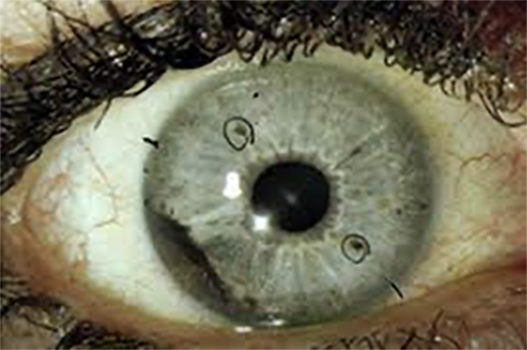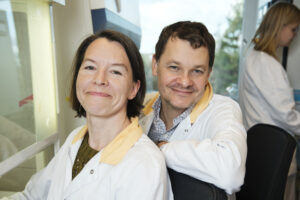
An unusual and often fatal form of eye melanoma shows early response to new combination of treatments. New discoveries in treatments are all about improved health outcomes for people who have diseases like cancer, and providing them with more time with families.
Thanks to the ongoing support of donors and community for Harry Perkins Institute’s medical research, the Perkins Melanoma Discovery team in Western Australia, with international colleagues in Sweden, may have discovered a new treatment for eye cancer (eye melanoma).
Australia has the highest rate in the world of the deadly skin cancer, melanoma, but some melanomas don’t occur in the skin.
About two percent of melanoma patients suffer a type of melanoma which begins in the eye.
Called uveal melanoma, this form of melanoma is the most common cause of primary tumours in the eye.
Uveal melanoma, or eye melanoma, mostly affects fair skinned Caucasians who have a light eye colour.
One of the world’s leading melanoma experts, Professor Jonas Nilsson, relocated to Perth with his coworker and wife Dr Lisa Nilsson in late 2020 from Sweden to join the Perkins as the inaugural Chair of Melanoma Discovery.
Professor Nilsson says, “surgery or radiation have been the main forms of treatment of eye melanoma and early detection improves long term survival, but for 50 percent of patients the cancer spreads to the liver.
“Once the cancer has spread, eye melanoma has a very quick and high mortality rate. For this group there are no effective treatments.
“With my wife, Dr Lisa Nilsson, who is an expert in growing tumours from patients in the lab, we had previously found that epigenetic treatments – treatments that regulate various cellular responses – were capable of affecting some genes that regulate the immune system in lymphoma, so we decided to test whether these treatments could affect the same genes in eye melanoma.”

Dr Lisa Nilsson (left), and Professor Jonas Nilsson (right) – Harry Perkins Institute’s Chair of Melanoma Discovery.
At the Perkins, Professor Nilsson’s Melanoma Discovery team continues to collaborate on research into different ways to treat melanoma disease with colleagues at Sweden’s University of Gothenburg.
The Swedish team combined immunotherapy with the epigenetic therapy Entinostat, a synthetic drug which potently and selectively inhibits certain enzymes and tumour cell growth.
“The combination of immunotherapy, which boosts a patient’s own immune system, and Entinostat showed potent killing of uveal melanoma cell lines,” Professor Nilsson says.
“In Sweden, where we began this research, only about 80 people a year are diagnosed with eye melanoma which meant we only had a small number of surviving patients to test our treatment on.
“Nearly half died during the trial from their uveal melanoma metastases, but a few patients responded to treatment and their tumours shrunk.
“While this was a very small trial group, we did find that the combination of drugs worked well against the tumours where a particular gene was functional.
“This gene, BAP1, is often inactivated in the uveal melanoma that has spread, or metastasised.
“What we found was that patients which had tumours that metastasised without inactivating BAP1 had a better response to combined epigenetic therapy.
“We now have results of a trial that involved patients with metastatic cancer where some had very good outcomes and are still living after three years.
“We are continuing this research in Perth to investigate why inactivation of BAP1 results in resistance to our therapy and to see what changes in blood components may further predict better survival after immunotherapy in eye melanoma patients,” Professor Nilsson says.
This research was published in Nature Communications (27 August 2021): “The PEMDAC phase 2 study of pembrolizumab and entinostat in patients with metastatic uveal melanoma”
~ Link to the publication: https://go.nature.com/3gWOJ1U
+++
** Prof Nilsson and his coworker and wife Dr Lisa Nilsson conduct research on metastatic melanoma of the skin and eye (also called uveal melanoma). Their group has done seminal contributions in genetics of the disease, in disease laboratory modelling and in starting of clinical trials. At Perkins they are heavily involved in biobanking of patient biopsies and advanced analysis of immunotherapy-resistant melanoma.
+++
Related media coverage: The West Australian 31 August 2021, “Perth husband and wife research team discover treatment for rare and deadly eye cancer” by Charlotte Elton
